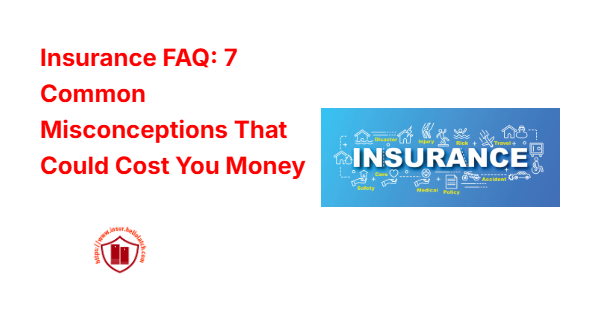
When it comes to insurance, there are a lot of myths and misconceptions that can lead to poor decisions, potentially costing you money. Understanding the truth behind these myths is essential for getting the best value out of your policies and ensuring that you’re adequately covered when the unexpected happens. To help you navigate the world of insurance, here are 7 common misconceptions that could end up costing you more than you think.
1. “The Cheapest Policy Is Always the Best Deal”
It’s tempting to opt for the cheapest insurance policy to save money upfront. However, the lowest premium doesn’t always mean the best deal. Often, cheap policies come with higher deductibles, fewer benefits, or limited coverage options. By choosing a policy solely based on price, you could end up paying more in the long run, especially if you need to file a claim. Always consider the balance between cost and the level of coverage you need to ensure you’re fully protected.
2. “Your Auto Insurance Covers Any Accident”
Many drivers assume that their auto insurance will cover all types of accidents, but this isn’t always the case. Basic car insurance policies typically only cover damages to your own vehicle, and not necessarily the other party’s car or property, unless you have liability coverage. For a more comprehensive policy, you’ll need to add coverage such as collision or comprehensive insurance to protect yourself from a wider range of incidents, including theft, vandalism, or weather-related damage.
3. “Homeowners Insurance Covers All Types of Damage”
Homeowners insurance is crucial for protecting your home and belongings, but it doesn’t cover every type of damage. For example, most policies don’t include coverage for floods, earthquakes, or certain types of water damage. If you live in an area prone to these risks, you might need to purchase separate coverage, such as flood insurance or earthquake insurance, to ensure that your home is fully protected. Always read your policy carefully and consider additional coverage options if necessary.
4. “Health Insurance Covers All Medical Expenses”
While health insurance provides significant coverage, it doesn’t cover everything. Many policies have exclusions for certain treatments, services, or medications, and you may still face out-of-pocket costs like copayments, deductibles, or coinsurance. Additionally, many health plans don’t cover services such as dental and vision care unless you purchase separate policies for those. It’s important to understand the limitations of your plan, review your benefits annually, and consider supplemental insurance if necessary.
5. “You Don’t Need Life Insurance if You’re Young and Healthy”
Many people believe that life insurance is only necessary for those with dependents or those who are older. However, purchasing life insurance when you’re young and healthy can be a smart financial move. Premiums for younger policyholders are typically much lower, and locking in a policy early ensures you have coverage at a more affordable rate. Life insurance can also serve as a valuable financial tool for long-term savings, especially if you opt for whole life or universal life insurance.
6. “If You Don’t File Claims, You’re Overpaying for Insurance”
It’s common for people to assume that if they don’t file claims, they are wasting money on insurance. However, insurance is designed to protect you in case of unexpected events. Even if you never file a claim, the peace of mind and financial protection it provides are worth the cost. Skipping out on insurance could leave you financially vulnerable in case of an emergency, and the cost of a claim could easily exceed the price of your premiums over time.
7. “Your Employer’s Health Insurance Is Enough”
While employer-sponsored health insurance can be a great benefit, it may not be enough to fully protect your health and wellness. Many workplace health plans come with limited coverage, high deductibles, and narrow networks of doctors. In some cases, you may need to supplement your employer’s insurance with additional coverage, such as dental, vision, or mental health services, to ensure you’re fully covered. It’s important to review your employer’s health plan each year and assess whether you need extra coverage to fill in any gaps.
Conclusion
Insurance can be complicated, but understanding the truth behind these common misconceptions can help you make better decisions and avoid unnecessary expenses. By not falling for myths like the cheapest policy being the best deal or assuming your current coverage is enough, you can ensure that you’re properly protected while avoiding costly mistakes. Always take the time to review your insurance policies, ask questions, and explore your options so that you can make informed choices that fit your unique needs and budget. Don’t let these myths cost you money—arm yourself with knowledge and secure the coverage you need for peace of mind.

Chhuanmawii 13